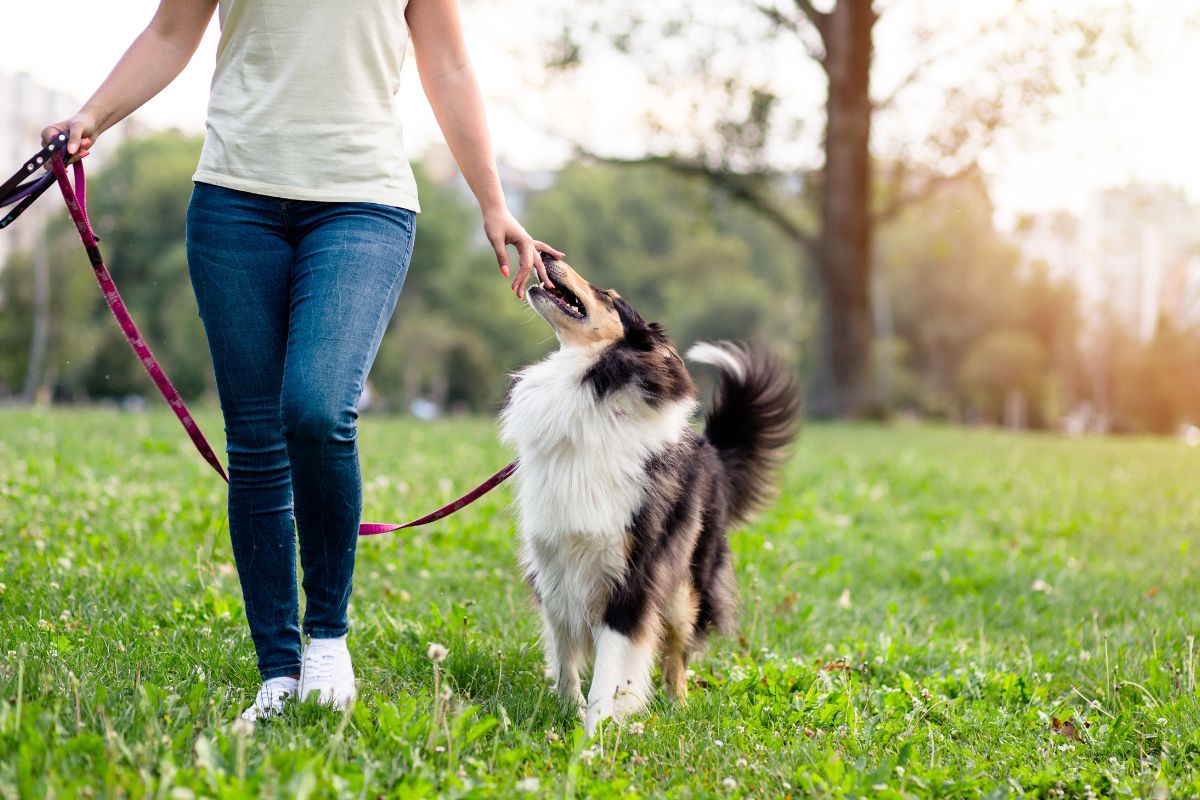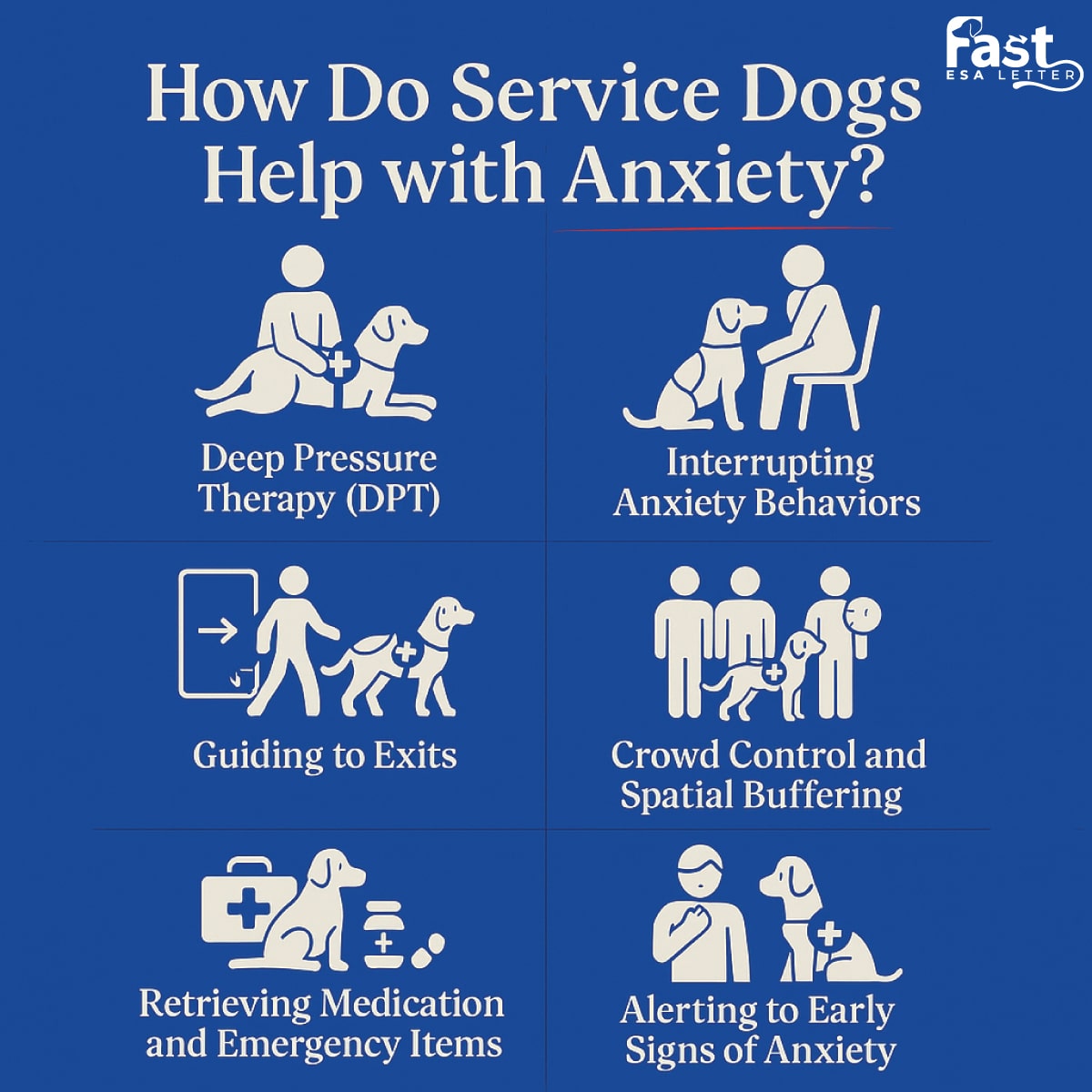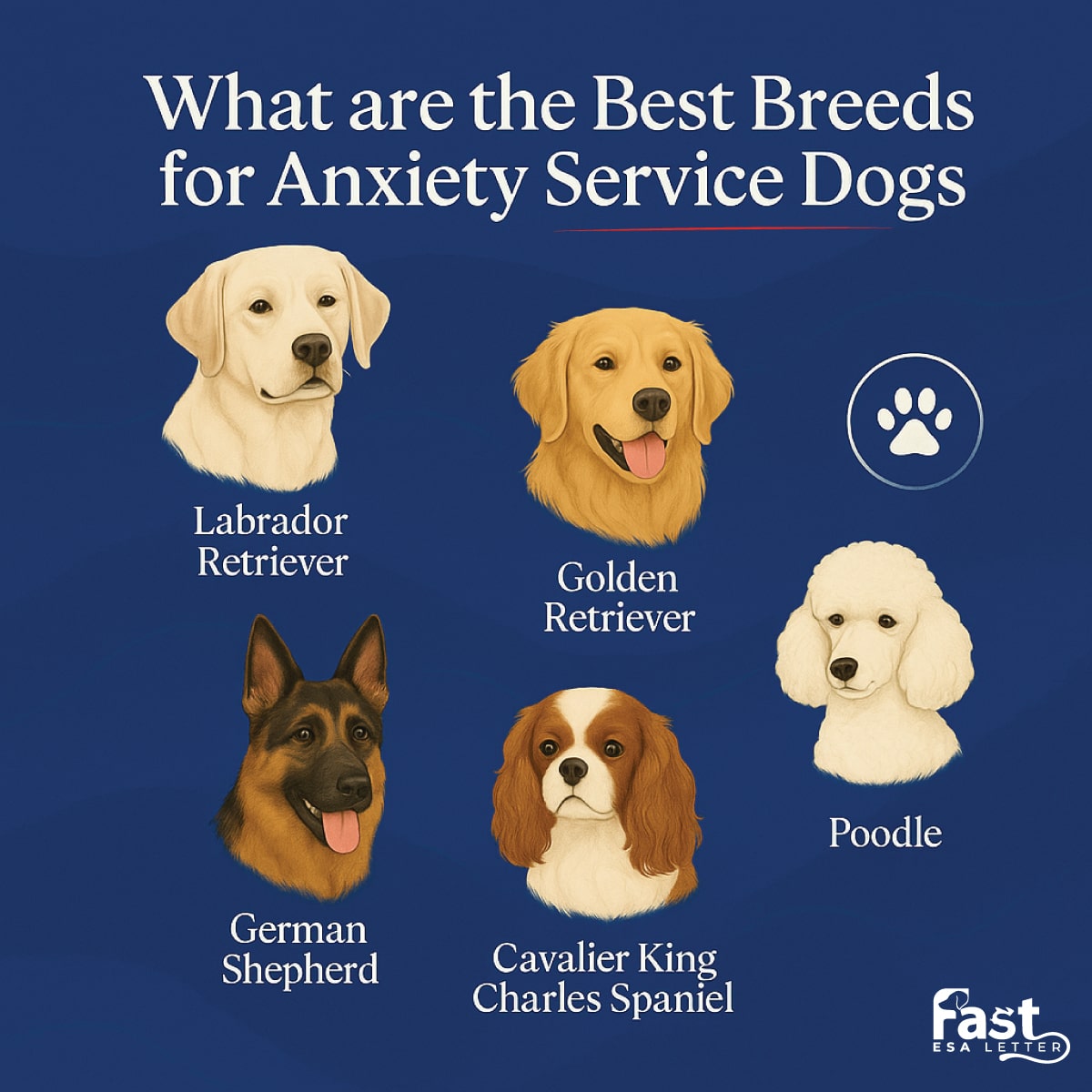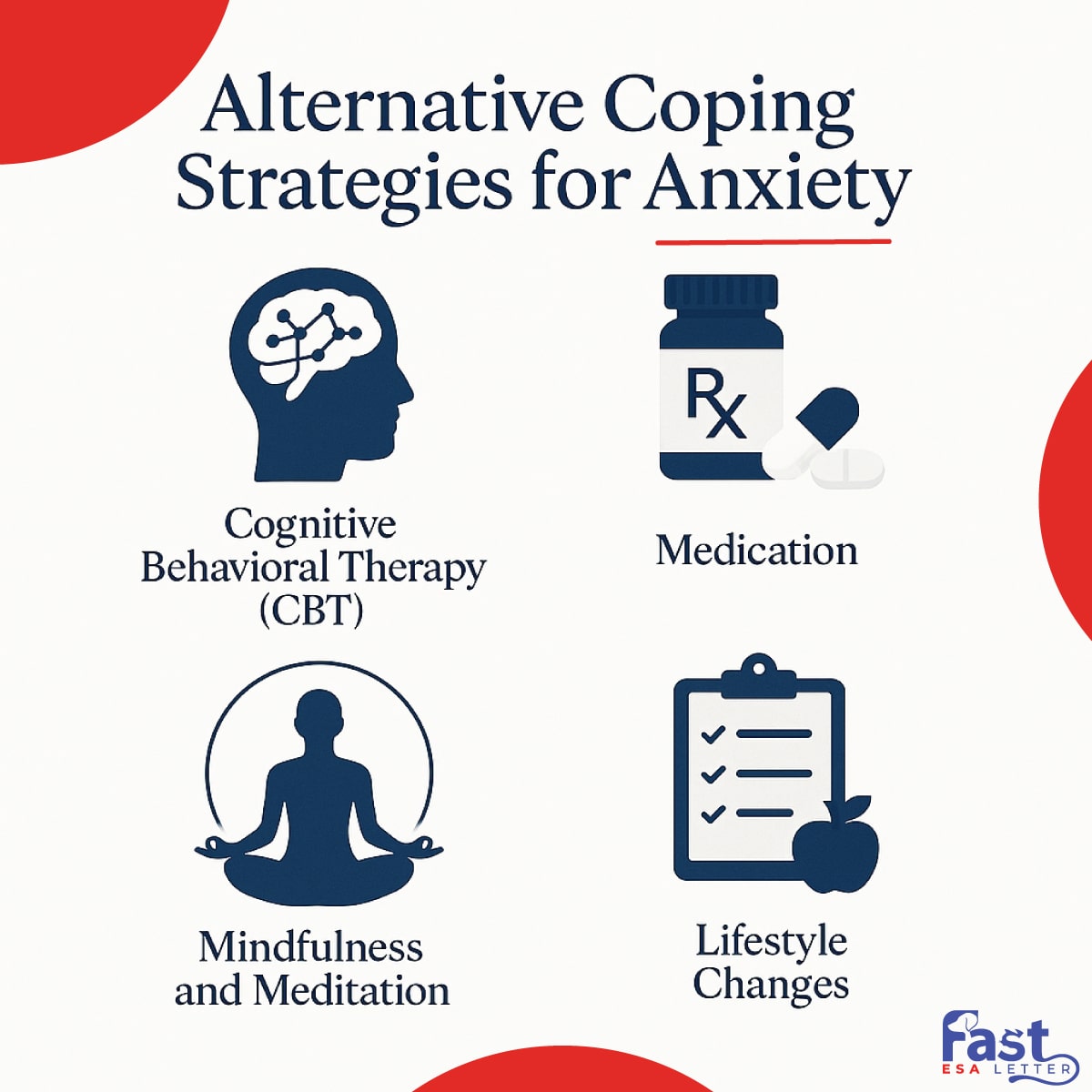How to Get a Service Dog For Anxiety in 2025?

Robert Clendenin, MD
Getting a service dog for anxiety is entirely possible—provided your condition significantly limits your ability to function day-to-day and the dog is trained to assist with specific tasks. These psychiatric service dogs can detect rising anxiety, interrupt panic attacks, and help their handlers regain control in overwhelming situations.
If you’re exploring how to get a service dog for anxiety or want to understand if you qualify, this guide will walk you through everything you need to know—clearly and compassionately.

Key Points
- Psychiatric service dogs are trained to assist individuals with severe anxiety.
- You must have a qualifying mental health condition diagnosed by a licensed professional.
- Service dogs perform tasks such as interrupting anxiety episodes and providing deep pressure therapy.
- There are specific legal rights under the ADA for people with service dogs.
- The process to obtain a service dog involves evaluation, training, and often a waiting period.
How Do Service Dogs Help with Anxiety?
These highly trained animals can support individuals experiencing a range of conditions, including generalized anxiety disorder (GAD), panic disorder, social anxiety disorder, and post-traumatic stress disorder (PTSD).
Key Ways How Service Dogs Help With Anxiety
- Deep Pressure Therapy (DPT): By applying firm but gentle pressure using their body, service dogs can reduce cortisol levels and lower heart rate, helping calm the handler during moments of acute anxiety or panic attacks.
- Interrupting Anxiety Behaviors: Service dogs are trained to recognize and disrupt behaviors such as shaking, fidgeting, nail-biting, or self-harm tendencies, offering redirection and grounding through physical touch or nudging.
- Guiding to Exits: In situations where anxiety becomes overwhelming—such as in crowded, noisy, or overstimulating environments—service dogs can lead the handler to a safe exit point, minimizing distress and ensuring safety.
- Crowd Control and Spatial Buffering: Psychiatric service dogs are taught to create physical space between their handler and others in crowded areas. This “buffering” technique helps reduce sensory overload and prevent panic escalation, especially useful for individuals with social anxiety.
- Retrieving Medication and Emergency Items: During an anxiety episode, service dogs can be trained to fetch prescribed medication, water, or a smartphone, allowing the individual to take necessary steps toward stabilization.
- Alerting to Early Signs of Anxiety: Some service dogs can sense physiological changes—such as increased breathing rate or perspiration—and alert their handler to take preventive actions before a full-blown anxiety attack occurs.

What Are the Legal Protections for Service Dogs for Anxiety?
In the United States, the Americans with Disabilities Act (ADA) provides robust legal protections for individuals with qualifying disabilities, including those related to mental health. Under this law, service dogs are granted access to most public places where pets are typically not allowed.
This means that a psychiatric service dog can accompany its handler into restaurants, retail stores, public transportation systems, schools, workplaces, and even some housing units with no-pet policies.
Public entities and businesses are permitted to ask only two questions:
- Is the dog required because of a disability?
- What specific task has the dog been trained to perform?
They are not allowed to request medical documentation, require the dog to demonstrate its tasks or ask about the nature of your disability.
How to Get a Service Dog for Anxiety?
For individuals exploring how to get a service dog for anxiety, the process begins with verifying your mental health condition and proceeds through training or acquiring the appropriate service animal. One of the most accessible and legitimate pathways is through a licensed provider like Fast ESA Letter, which connects individuals with licensed mental health professionals (LMHPs) authorized to issue psychiatric service dog letter.
Step-by-Step Guide to Getting a Service Dog for Anxiety
- Schedule an Appointment Online:- Begin by visiting the Fast ESA Letter platform, where you can create an account and schedule an appointment with a licensed mental health professional using a simple online form.
- Consult with a Licensed Mental Health Professional:- You will be scheduled for a video or audio consultation with a licensed therapist. During this session, the clinician will evaluate your mental health status, assess whether your anxiety disorder qualifies as a disability under the Americans with Disabilities Act (ADA), and determine if a psychiatric service dog is an appropriate and recommended part of your treatment plan.
- Receive Your Psychiatric Service Dog Letter:- If you qualify, you will receive a signed PSD letter by email—typically within 24 to 48 hours. This letter validates your eligibility to have a service dog for anxiety and can be used to assert your legal rights in public places, housing accommodations, and potentially at your workplace.
Once you’ve received your PSD letter, the next step is to acquire or train a service dog.
Options for Acquiring or Training a Psychiatric Service Dog
- Adopt a Fully Trained Service DogYou may choose to acquire a professionally trained psychiatric service dog from an accredited organization. These dogs are specifically trained to perform anxiety-mitigating tasks and are ready for immediate integration into your lifestyle. This option is best suited for individuals who require immediate, specialized support. However, it often involves long waitlists and high upfront costs.
- Train Your Existing PetIf you already have a dog with a suitable temperament and health profile, you can train yourself to become a psychiatric service dog. This requires the dog to learn specific, legally compliant tasks related to your anxiety. While this approach is more cost-effective and allows for a personalized training experience, it demands time, consistency, and access to proper resources.
- Hire a Professional TrainerAnother effective option is hiring a professional dog trainer who specializes in psychiatric service animals. This path provides expert guidance in teaching your dog to perform essential tasks, while also strengthening obedience and public access behavior. It’s ideal for individuals who wish to retain their current dog but prefer structured, professional assistance throughout the training process.
What are the Best Service Dogs Breeds for Anxiety?

- Labrador Retriever: Known for their friendly and gentle nature.
- Golden Retriever: Intelligent and eager to please, making them highly trainable.
- Poodle: Hypoallergenic and highly intelligent, suitable for individuals with allergies.
- German Shepherd: Loyal and protective, often used in various service roles.
- Cavalier King Charles Spaniel: Affectionate and attuned to their handler’s emotions.
Selecting the right breed depends on individual needs, lifestyle, and any specific requirements related to the handler’s anxiety.
What is the Cost of Getting a Service Dog for Anxiety?
The cost of getting a service dog for anxiety depends on how you acquire or train the animal:
- Fully Trained Psychiatric Service Dog: $15,000–$50,000
Includes expert training, certification, and immediate readiness for anxiety-related tasks. Ideal for those needing urgent, professional support. - Self-Training or Hiring a Professional Trainer: $1,500–$10,000
More affordable, this option allows for custom training and is suited for individuals with an existing dog or hands-on preferences. - PSD Letter Evaluation via Fast ESA Letter: $149
Covers a licensed mental health evaluation, live consultation, and legally valid documentation required under the ADA.
In addition to initial costs, expect annual maintenance expenses between $1,000 and $2,500, covering food, grooming, vet care, and general upkeep.
For individuals researching how to get a free service dog for anxiety, some nonprofits and charities provide support based on eligibility. Options like community grants, veteran programs, or crowdfunding may also help reduce the financial burden.
Can I Make My Dog a Service Dog for Anxiety?
Yes, you can make your dog a service dog for anxiety, provided your dog meets the necessary behavioral, health, and training standards.
Basic Requirements to Convert Your Dog into a PSD:
- Temperament & Suitability: Your dog should have a calm, attentive temperament and the ability to focus in a variety of public settings.
- Health & Hygiene: A PSD must be in good physical health and properly vaccinated. Cleanliness and grooming are essential for public access.
- Task-Based Training: Your dog must be trained to perform at least one task that directly mitigates your psychiatric symptoms—such as interrupting anxious behaviors, providing deep pressure therapy, or guiding you out of distressing situations.
You can either train the dog yourself, using structured programs and positive reinforcement methods or hire a professional trainer to assist with advanced behavioral and task training.
Alternative Coping Strategies for Anxiety

- Cognitive Behavioral Therapy (CBT): Helps restructure negative thinking patterns.
- Medication: Prescribed by psychiatrists to regulate mood and anxiety levels.
- Mindfulness and Meditation: Reduce physiological symptoms of anxiety.
- Support Groups: Provide a sense of community and shared understanding.
- Lifestyle Changes: Diet, exercise, and sleep hygiene play a significant role in mental health management.
These strategies can complement the support provided by a psychiatric service dog or serve as a standalone approach for those not eligible or ready for one.
Conclusion
Living with anxiety is challenging, but a psychiatric service dog can offer life-changing support. Whether you’re wondering how to get a service dog for anxiety or understanding the legal process, it all starts with proper documentation and a trained companion tailored to your needs.
From self-training to professional options—and with services like Fast ESA Letter simplifying the approval process—there’s a path for every lifestyle and budget. Getting a service dog isn’t just about support; it’s about reclaiming independence, confidence, and peace of mind.
Frequently Asked Questions (FAQs)
Do I Need To Register My Service Dog For Anxiety?
Can Children Or Teens Get A Service Dog For Anxiety?
Are There Breed Restrictions For Psychiatric Service Dogs?
Can A Service Dog Help With Both Anxiety And Depression?
How Long Does It Take To Train A Service Dog For Anxiety?
What’s The Difference Between An ESA And A Psychiatric Service Dog For Anxiety?
Is It Possible To Train A Service Dog For Anxiety At Home?
Do Service Dogs For Anxiety Need To Wear A Vest Or Id?
Post Author
Prince Sharma
Related Articles
No Results Found
The page you requested could not be found. Try refining your search, or use the navigation above to locate the post.
Live Free with Your ESA!
An ESA Letter Unlocks Freedom!


